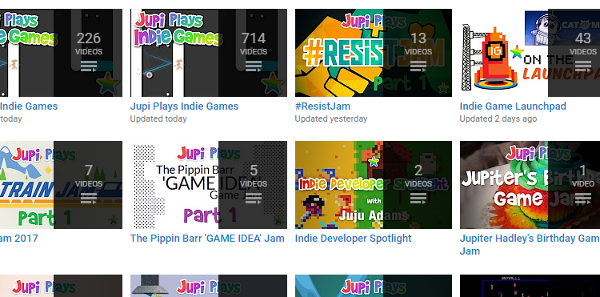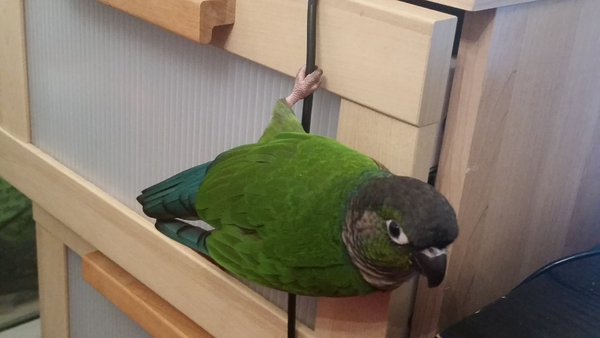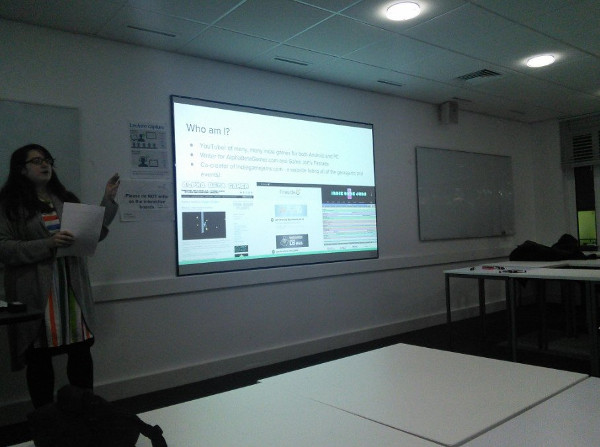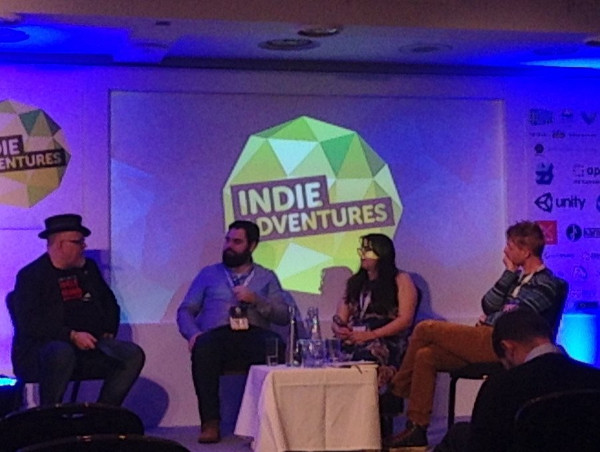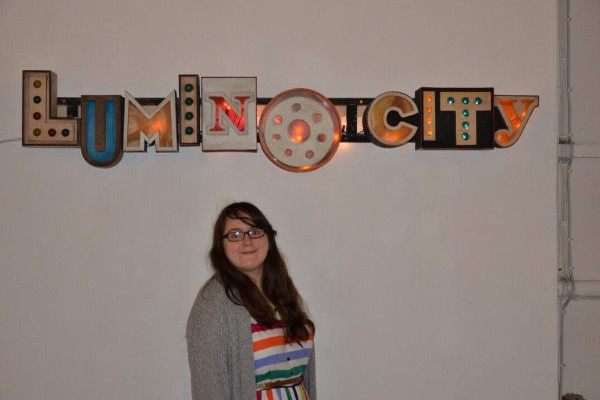A Chat With: Jupiter Hadley
Hi Jupiter. Can you give a quick rundown of what you do for the people that don’t know who you are?
Hello Kemp! I do quite a bit in the indie gaming community. I feel like I am most known for covering tons of game jam games. Basically, I cover all of the games entered in nearly all of the game jams that happen online (and sometimes around the world) on my YouTube Channel. I also co-run indiegamejams.com—a calendar of indie game jams! I cover singular indie games on my YouTube channel as well.
I also write about games for various places like Alpha Beta Gamer, GameJolt’s Fireside, Playsource, and Indie Game Launchpad. Monthly, I do a sort of podcast-y game developer interview on Soundcloud and on my YouTube Channel. Sometimes I go to events to cover them as press or to give talks on games!
Yeah, I think thats about it?
You certainly cover an impressive number of game jams. Was there a moment when you realised that you wanted to cover several thousand indie games per year and just started doing it or was it more of a gradual process that built up over time?
Hmm, I am not sure if I had a realisation that made me want to do it. It was more of a challenge. @Contralogic, an indie developer himself and a very dear friend to me, had suggested I cover indie games on my YouTube channel, since I tried making games but really sucked at it. So, basically, after covering single Let’s Plays of individual indie games, he showed me the Ludum Dare and suggested I play the highlights from that. I said something along the lines of “how would I know the highlights unless I played them all?”. He told me that I couldn’t play them all. I said I could and I would find my favorites that way! He said I definitely could not as the Ludum Dare gets tons of entries, and I took that as a challenge.
I did not know he meant like over 1,000 entries per Ludum Dare, but I took on the challenge and played around 600 of them. People really liked it, so I figured I would cover as many jams as I could. At the time, there were around 5 jams a year, Ludum Dare being the biggest. Most of the other jams had only 10 or 20 games entered, so it was totally manageable.
But, then jams became popular and everyone started running them and doing them, so I just followed suit as best I could!
Covering all these jams must require a lot of recording time per day and you’ve mentioned to me before that you don’t exactly live in a mansion. How do you manage to record in a small space, that you share with your partner, while you both also go about your day-to-day chores, relaxing, and so on?
Ah, well, we just moved to a house share in London which is still bigger than our tiny old house. Our old house… sucked. I hated it there. I’ll draw you a mental picture of the place.
My office was a bedroom. This bedroom had a wardrobe on the left of the door which faced into the middle of the room. Straightforward from the door was my tiny little desk. It blocked the wardrobe so you couldn’t get into my side of it. The other (right) side of my desk almost touched my mattress. If I backed up my chair too much, it normally hit the side table and I would smash my arm against the wardrobe. Under my desk lived the power extension cord. This would not allow me to move my chair under my desk, so I would slam my chair into that often. Man, it was a tiny, tiny place.
That was the bedroom. We also had a living room/kitchen which used to have my desk in, but cooking and Kiwi (my conure) were just far too loud for it to stay out there.
Because everything was so small, it was very, very difficult to do multiple things at once. I could not record while my partner did dishes for example, even though we were in different rooms. The walls were so thin that the noise of the dishes were picked up by my microphone and people would point it out in the videos.
So basically, every day I would wake up, do articles in the morning and make lunch. Once lunch was done (and dishes from last night’s dinner) we would eat and then I would record. My partner would hang out in the living room or on our bed, doing whatever he does. Sometimes he would go out while I recorded, though Kiwi does freak out and the door is quite loud, so we would normally plan that around what I was doing. Basically, my partner is nice enough to tip toe around everything I do, and we had to communicate a lot to plan anything. In the evening, we normally made dinner, did lunch’s dishes while dinner was cooking, ate, and then I went back to recording until bed. Washing, like laundry, had to be done during meals as well, as again it was too loud.
Until recently you lived in a fairly remote part of England and, while there were a few regular indie gaming meetups and event in the general area, it ended up with you needing to travel in order to attend a lot of the larger or more well-known events. Would you say that meeting members of the indie development community in person is an important part of being able to do what you do?
Yeah, I used to live in the middle of nowhere, England… but before that I lived in the middle of nowhere America. I had no idea that there really were indie gaming events until someone gave me a ticket to EGX Rezzed when I had moved to England. It was amazing—I got to meet so many people and see so many awesome games.
Separately, also after I moved to England, I was approached by some members of the Plymouth University to give a talk to their Game Developers Society. I had never given a talk related to games before and had never really even been asked. It was an amazing experience, I didn’t think it was something I would ever be doing. Moving to England was a very big change.
From there, I started attending more events, applying for press passes, and being asked to give more talks at various events. Going to events has always been sort of hard for my partner and I. I suck at traveling and generally knowing where I am, and honestly, I prefer to travel with someone as opposed to alone.
Traveling from the tail end of England to events in London, Nottingham, Brighton, and to airports out of the country is so expensive, making it hard to do. We both don’t make a ton of money, so it’s sort of a big endeavour to drive that far and stay in a hotel. Also, it’s a lot of travel time—driving, getting someone to watch Kiwi, parking the car at the other end, it all was quite the struggle. Most of the time we relied on people like you, who offered to let us stay with them while we were at events.
Anyway, getting a bit off topic, going to these events were so worth it. I made connections that led to more events, talks, and people. I feel like the people I met have really helped me continue and boost my “career”. I’ve met people who have said I made a difference in their lives, in their game development career, that playing their game motivated them to continue, that saying a few kind words and spending a moment on their game made their whole days. Meeting these people really made all the time and energy I put into playing these tiny games worth it. I’ve made so many friends in the indie community, and basically all of them are from these events.
They are becoming such a big part of my life that they became one of my deciding reasons to move to London. All of my friends now live here, they attend events here, they hang out at places near here. So moving here means I get to be closer to the community and closer to more events and opportunities.
You do have to make the most of these events, of course, which took some learning. Before the event, you need to pre-record tons of stuff for the people that watch you but are not attending. At the event, you need to put yourself out there, introduce yourself to people, hand out and ask for business cards. When you come home, you need to email people who gave you business cards, follow up, and make more connections.
Being able to meet people face to face has opened up so many doors for me, I am so glad I have met so many people. It’s really helped motivate me in so many ways.
You mentioned that you give talks on gaming and game dev related topics. Public speaking is something that I’ve never been great at. Have you had experience with it before or have your talks over the last 2 years been your introduction to it?
Yeah, so I have been doing small talks here and there for games over the last couple of years. Before that, I use to have to do quite a large amount of public speaking in High School. Before I was obsessed with indie games, I use to volunteer for over 1,000 hours a year through school. I was part of a few volunteer organisations in school, but the one that taught me how to speak in public was Key Club.
Key Club, for those who don’t know, is a huge volunteer organisation that is student run. I started out as a secretary, but moved up to be the president of my club. This meant I held meetings and represented my club when it came to division (statewide) events. From there, I ended up getting the position of Lt. Governor, which is the highest statewide position. This meant that I overlooked and ran 11 Key Clubs in upper NY state.
On a monthly basis, I had to go to these clubs, give talks and workshops on how to volunteer, and run events both outside and inside the state. Three times a year I ran events for all of the clubs in one location, twice a year I attended and held workshops for all of the Key Club members in NY state (and once from around the world in Florida).
These events taught me a lot because we were all held to a very high standard. You would be given a topic to run a workshop around, and then you had a few months to make your workshop. From there, you would pitch them to adults who would literally point out everything you did wrong, then you restarted and made it better.
This club was a hell of a lot of pressure and I spent a lot of time organising the other clubs in my district, which probably is why I am so organised now. I also sent out newsletters and emails on a regular basis.
Finally, even in the short time I’ve known you I’ve seen you expand the number of sites you write for and the events you attend and speak at. Is there anything on the horizon that you’re planning and can tell us about?
Well, we have just moved to London, so I hope to just do more of what I am doing. More talks, more events, more writing, more everything. I am the type of person that doesn’t say no to opportunity, so anything that comes along I will probably try.
I am working on diversifying my channel with spotlights and some more known indie games, I have started writing for Playsource and IndieGameLaunchpad. I also now run the newsletter over at IndieGameLaunchpad. Thats pretty cool. I have been toying around with the idea of doing a physical and digital zine about game jams. It is currently just an idea, so we will see what the future holds!
I hope you’ve found this interview interesting. If you’d like to check out Jupiter’s work then you can find it at the links given in the article and you can find Jupiter herself on Twitter. She also has a Patreon if you wish to support her work.
